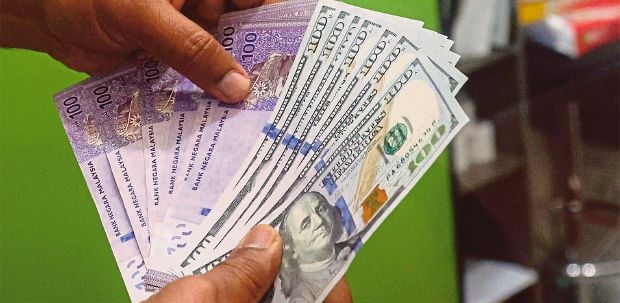KUALA LUMPUR: Foreign investors' appetite for Malaysia's sovereign and corporate bonds will likely be less this year amid a weakening currency, dwindling hedged returns and slowing global economic activity.
Economists said the country's sovereign bonds particularly may face a bleak prospect over the near term due to the negative sentiment surrounding the ringgit.
"Currency views matter for foreign investors as the fluctuation in the exchange rate is also part of their investment return composition," Bank Muamalat Malaysia Bhd chief economist Dr Mohd Afzanizam Abdul Rashid.
"Apart from deriving income from coupons, reinvesting the coupon and potential capital gain, currency movement is also part of their returns composition," he told Business Times today.
However, Afzanizam noted that the Malaysian Government Securities (MGS) yields are on the uptrend, due to the higher US Treasury (UST) yields.
"There is a strong correlation between the 10-year UST and 10-year MGS yield at 72 per cent. Since the US Federal Reserve is unlikely to cut the interest rate in the near term, UST yields have gone up, leading to higher MGS yields," he added.
The demand for MGS has been decent this year, said Afzanizam.
"We have seen the RM5 billion Government Investment Issues (GII) issuance maturing July 31, 2028 drawing a total bids of RM22 billion during January this year with bid-to-cover ratio of 4.4 times," he noted.
Afzanizam noted a cautious stance on both corporate and government bonds, highlighting the potential for profit in the bond market due to expectations of an interest rate reduction.
"At the end of the day, it is about the interest rate outlook, especially in the US. I believe fixed income investors should be mindful of the duration risk as they dont want to expose themselves to the interest rate risk. Perhaps, shorter tenure would be more preferable if they want to trade," said Afzanizam.
In January, the domestic bond market was rattled by the Fed's hawkish shift, triggering bigger net outflow, said Kenanga Research.
For the second consecutive month in January, foreign investors reduced their exposure in Malaysia's debt securities, recording a bigger net outflow of RM5.1 billion (December: -RM2.1 billion), mainly driven by a sell-off in MGS) and Malaysian Treasury Bills (MTB).
Consequently, total foreign debt holdings declined to RM265.3 billion in January (December: RM270.4 billion), with its share to the total outstanding debt reaching an 11-month low of 13.2 per cent (December: 13.6 per cent).
Kenanga Research said while investors might continue to hold US debt for a while longer due to its attractive yields and high coupons, the anticipated Fed rate cuts in the second half of 2024 could lessen their interest, especially in Treasury floaters.
"As Fed Fund rates decrease, investors seeking to maintain their yields may turn towards high-yielding emerging market debt, especially to countries where central banks are not planning rate cuts," it added.
SPI Asset Management managing director Stephen Innes said with UST yields being much higher than MGS, Malaysian bonds are primarily attractive to domestic investors.
"However, while international funds, which require full hedging against currency risk, are deterred, hedge funds seeking higher yields without hedging currency risk could potentially profit significantly once the currency appreciates.
"We currently do not own MGS, but we will buy 10-year on an unhedged basis once the US economic data weakens or there is proof that the January acceleration in US inflation was a seasonal lark," he added.
Innes noted that there are various durations available for MGS.
"The 10-year MGS, which is a good benchmark, is yielding 3.90 per cent, but unlike US bonds, which are considered risk-free, those are yielding 4.30 per cent," Innes added.
Regarding Bank Negara Malaysia's monetary policy, he expects it to remain neutral for a while due to the weaker currency.
He suggests that Bank Negara may want to cut rates, but the weaker currency may prevent it. Therefore, the domestic bonds are expected to trade neutrally.
Additionally, he said the increasing supply of the US corporate and government bonds in the first half of the year, leading to weaker bid-to-cover ratios as investors become more selective and demand higher term premiums.
"The weakness in bid-to-cover ratios across the board, indicates cautious investor sentiment in the bond market," he emphasised.





